Key takeaways:
- Improvisation fosters spontaneous creativity, enhancing emotional connection between performers and audiences.
- Engaging audiences through participation and storytelling transforms performances into shared experiences.
- Trust among bandmates and embracing mistakes are crucial for successful improvisational performances.
- Practice, audience interaction, and constructive feedback are essential for improving performance skills.
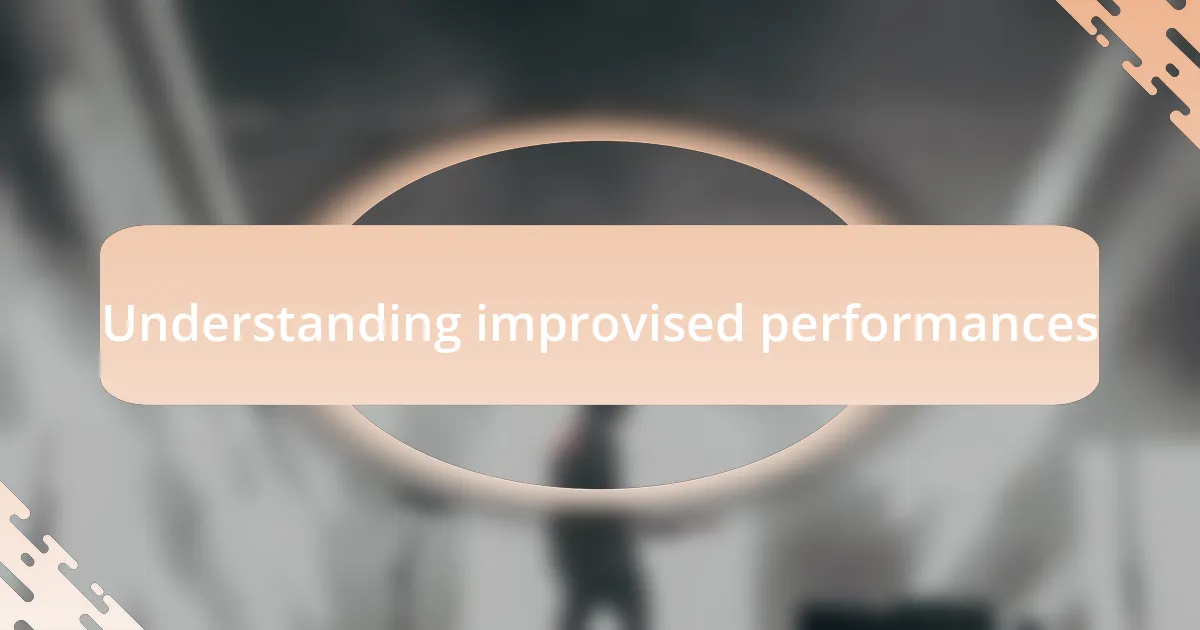
Understanding improvised performances
Improvised performances are a thrilling blend of spontaneity and creativity that can transform a musical experience. I still remember the first time I participated in an improvisational jam session; the energy in the room was electric. Every note played felt like a conversation, where musicians reacted to each other in real-time.
What fascinates me about improvisation is how it allows artists to express their authentic selves. I often find myself wondering: how many times do we hold back our true emotions in structured performances? Improvisation opens a door to vulnerability. For instance, I once saw a guitarist break into an unexpected solo during a quiet moment; it was raw and emotional, resonating with both the audience and fellow musicians in an extraordinary way.
The beauty of improvisation lies in its unpredictability; it creates unique moments that can never be replicated. I have had the opportunity to collaborate with talented musicians, and I’m always struck by how our shared interaction leads to musical discoveries that I would never have reached on my own. It’s like a dialogue where the stakes are high, but the rewards can be even greater. Wouldn’t you agree that moments like these are what make music feel truly alive?
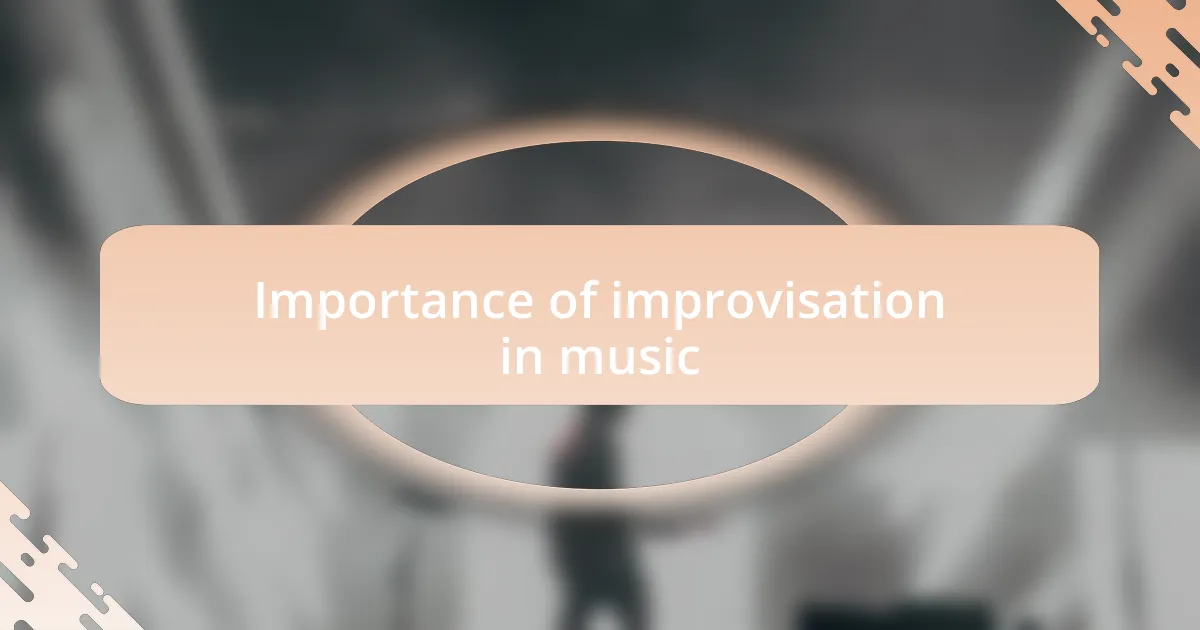
Importance of improvisation in music
Improvisation is fundamental in music, as it fosters creativity and spontaneity. I recall a time during a rehearsal when only a few of us were familiar with the song structure, yet we decided to explore different musical ideas. The result was an exhilarating mix of styles that not only surprised us but also strengthened our bond as musicians. It’s as if we were weaving a tapestry of sound that reflected our individual personalities and collective energy.
What strikes me about improvisation is its ability to deepen the emotional connection between performers and the audience. I remember watching a jazz performance where the saxophonist took an unexpected turn in his solo, pouring his heart into every note. In that moment, it felt like he stripped away all pretense, allowing us to feel the raw intensity of his expression. Isn’t it amazing how a single improvised note can resonate with so many people on such a profound level?
Additionally, improvisation serves as an important tool for skill development and adaptability. During my early days as a musician, I often struggled with rigid song structures. However, the more I immersed myself in improvisational settings, the easier it became to think on my feet and respond to musical cues. I now see each jam session as an opportunity to hone my skills, encouraging a mindset that thrives on collaboration and innovation. Don’t you think that embracing improvisation not only enhances our abilities but also makes our musical journey much more enjoyable?
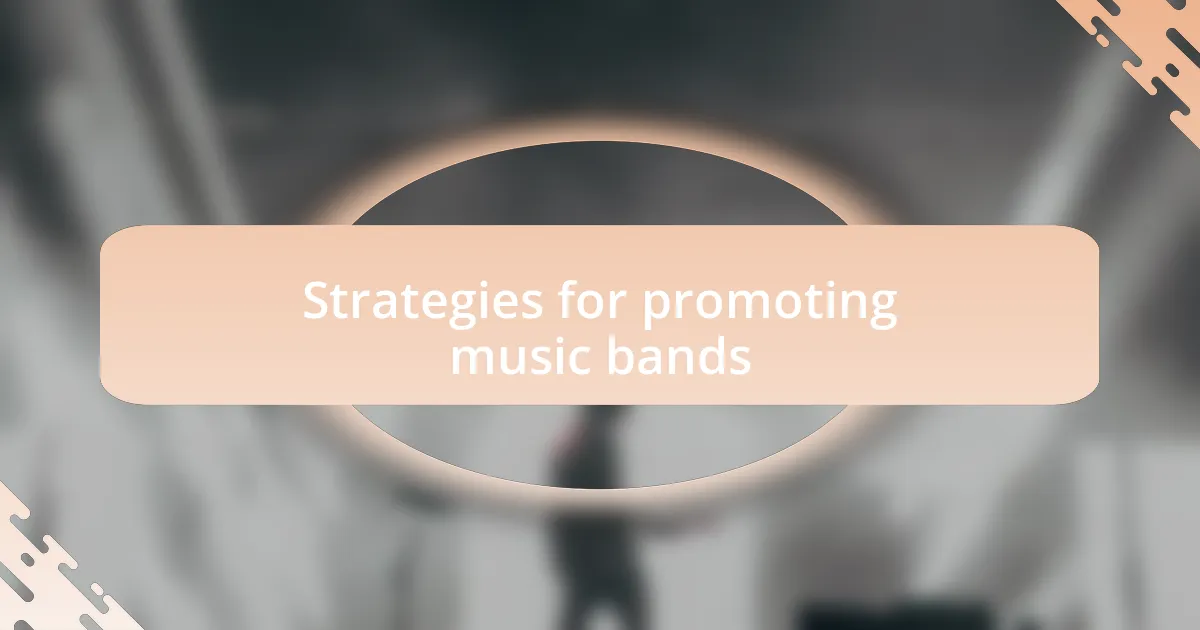
Strategies for promoting music bands
One effective strategy for promoting music bands is leveraging social media platforms to create authentic connections with fans. I remember when our band posted behind-the-scenes footage of our rehearsals, and the response was incredible. Fans aren’t just interested in the final product; they want to feel a part of the journey, don’t you think? Showcasing our creative process humanized us, leading to a more engaged and loyal following.
Another approach that worked wonders for us was organizing local gigs where we could invite friends, family, and potential fans. The energy of performing live, coupled with personal invitations, created an intimate atmosphere. I still recall the buzz of that first local show where audience members danced and cheered; it felt like we were part of a community rather than simply a band on stage. Isn’t it incredible how such experiences can foster a sense of belonging among fans?
Collaborating with other local artists is also a game changer in band promotion. When we teamed up with a neighboring band for a joint performance, we were able to tap into each other’s fan bases. Those shared moments of creativity not only expanded our reach but also enriched our own musical style. It’s a win-win situation—why not combine forces to amplify your presence?
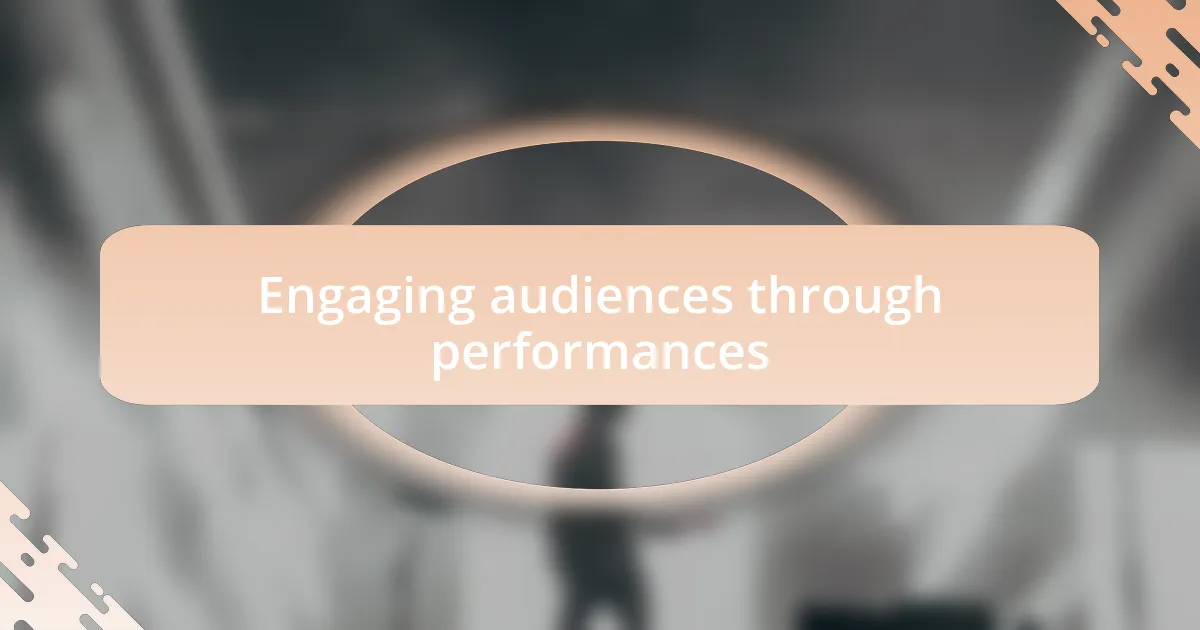
Engaging audiences through performances
I’ve found that the magic happens when you really connect with the audience during performances. I can still vividly remember a night when we invited fans on stage to sing a chorus with us. The joy in their faces and the energy radiating from the crowd transformed our gig into a shared experience. Isn’t it astonishing how just one moment can elevate an entire show into something unforgettable?
I also believe that storytelling enhances our performances and draws people in. In one of our sets, I took a moment to share the inspiration behind a song, tapping into the emotions that sparked its creation. The shift in the audience’s mood was palpable; they weren’t just watching us perform—they were invested in our journey. Can you imagine how powerful it is for fans to feel like they are part of the narrative, sharing the highs and lows of our music?
Engaging audiences goes beyond just music; it’s about creating an experience. During a recent show, we incorporated audience participation by encouraging everyone to clap along. That simple act turned a regular song into a vibrant celebration, energizing the entire venue. When you see fans laughing and dancing together, it’s clear that live performances offer a unique opportunity to build connections that social media simply can’t replicate. Wouldn’t you agree that these moments are what truly keep fans coming back for more?
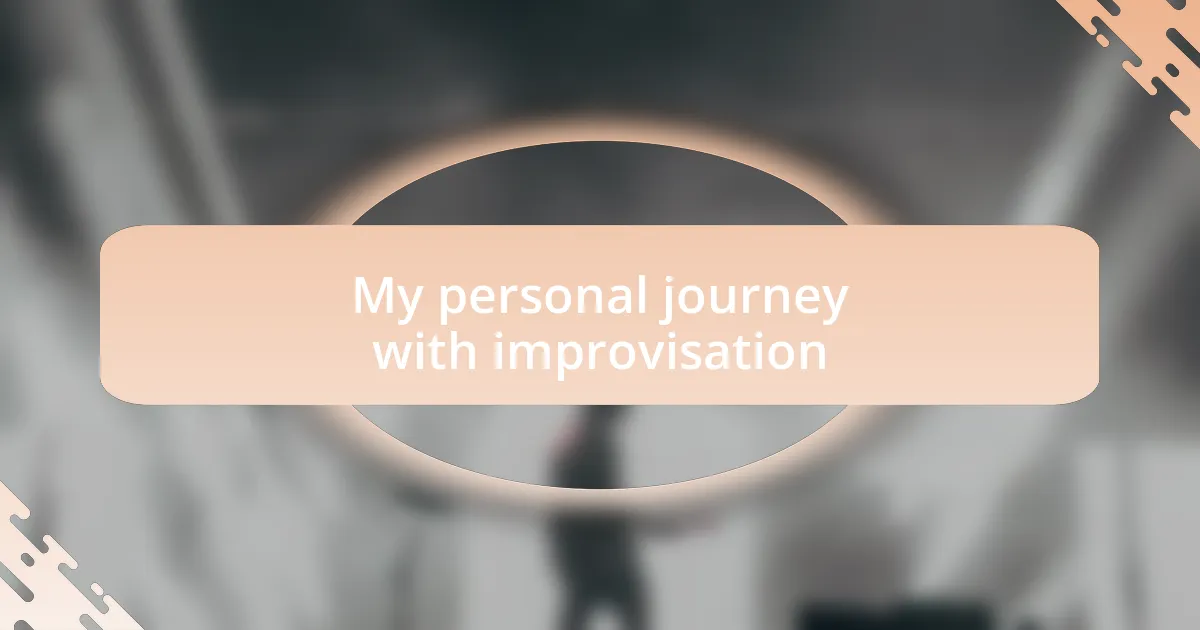
My personal journey with improvisation
Improvisation has always been a cornerstone of my musical journey. I remember my first real taste of it during a jam session. The moment I let go of my fears and instinctively followed the rhythm created by my bandmates, something clicked within me. It was exhilarating to realize that music could evolve in real-time, shaped by our collective energy and creativity. Have you ever had an experience where you just knew you were in the right groove?
As I continued to explore improvisation, I found it not just liberating but also a powerful tool for storytelling. During one performance, a technical issue forced us to play an extended solo. Instead of panicking, we turned it into a narrative of tension and release. In that moment, I felt the audience mirror our journey through music, a shared experience that transcended words. It’s fascinating how improvisation can transform unexpected challenges into moments of beauty, isn’t it?
Looking back, I see improvisation as a bridge to connection. There was a night when I felt completely in sync with the crowd, each chord and note resonating like a conversation. In those moments, I was reminded that music isn’t just about perfect notes; it’s about being present and allowing genuine emotion to flow. This connection made every spontaneous decision during a performance feel like a true collaboration with our listeners. Have you ever felt that kind of unity in a live setting? It’s an indescribable high that keeps me coming back for more.

Lessons learned from my experiences
One significant lesson I’ve learned is that improvisation requires trust—not just in myself but in my bandmates. I recall a night when everyone confidently followed each other’s leads, and our performance became a beautiful tapestry woven through shared instincts. In that moment, I realized that stepping back and allowing others to shine can lead to a richer, more dynamic experience.
Another insight I’ve gained is the importance of embracing mistakes. I remember a gig where a misplayed chord sparked an unexpected pivot in our set. Rather than dwelling on it, we decided to explore this new direction together, creating a spontaneous groove that transformed the entire performance. This taught me that sometimes, the best moments in music arise from the unplanned.
Perhaps the most profound lesson is understanding the role of vulnerability in improvisation. I once played before an audience that felt distant and unresponsive. Instead of just playing my usual set, I opened up, sharing a personal story through my music. The atmosphere shifted; suddenly, that vulnerable moment forged a deeper connection. Have you experienced how authenticity can turn the tide in a performance? It’s a reminder that when we bare our souls, we pave the way for genuine engagement.
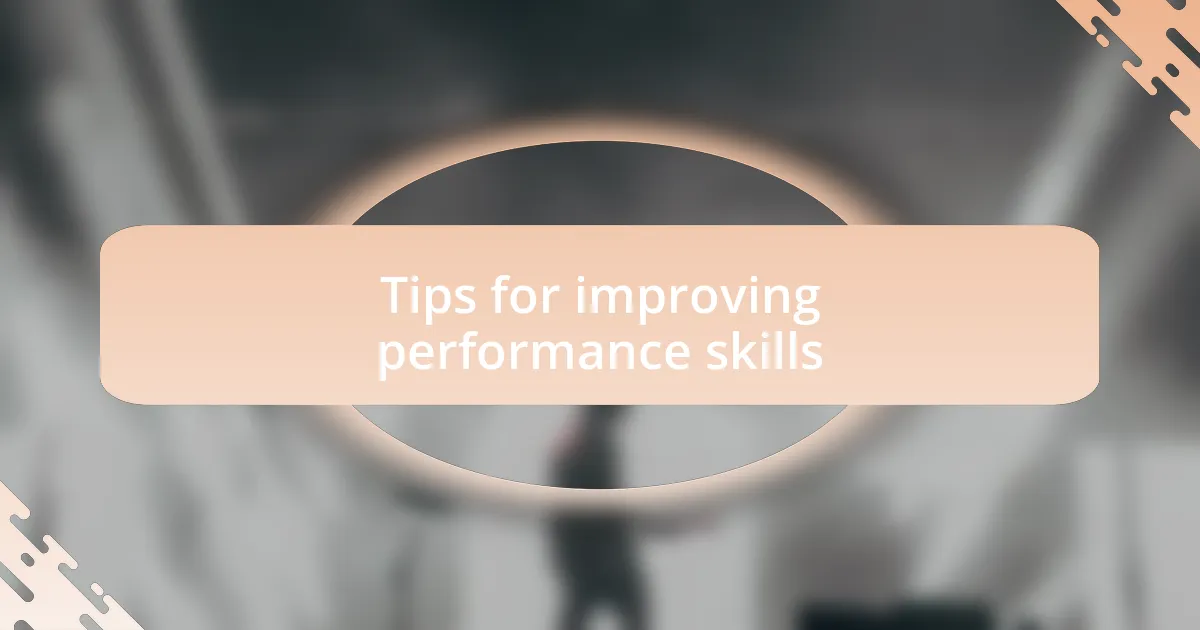
Tips for improving performance skills
When it comes to improving performance skills, one crucial element I’ve found is the power of practice. During my early days, I often overlooked rehearsals, thinking that spontaneity was all I needed. Yet, I vividly recall a performance where we had run through our setlist multiple times. The resulting synergy on stage was electric. Ready preparation not only boosts confidence but also allows room for improvisation, helping to turn a good performance into a great one.
Another tip is to truly engage with your audience. I once performed at a small venue where the crowd felt muted. Instead of sticking to my planned set, I began chatting with them, asking questions about their favorite songs. It was fascinating to see how making eye contact and sharing anecdotes created an immediate connection. I learned that audience interaction infuses energy into the performance and can inspire musicians to elevate their craft in real-time.
Lastly, never underestimate the power of feedback. After a show, I started asking my bandmates and even fans for their honest opinions about our performance. One night, a fellow musician pointed out how our transitions could be smoother. Initially, I felt defensive, but soon realized constructive criticism fosters growth. How often do we shy away from seeking input that can enrich our skills? Embracing feedback is like opening a window to fresh perspectives, allowing us to evolve continuously as performers.